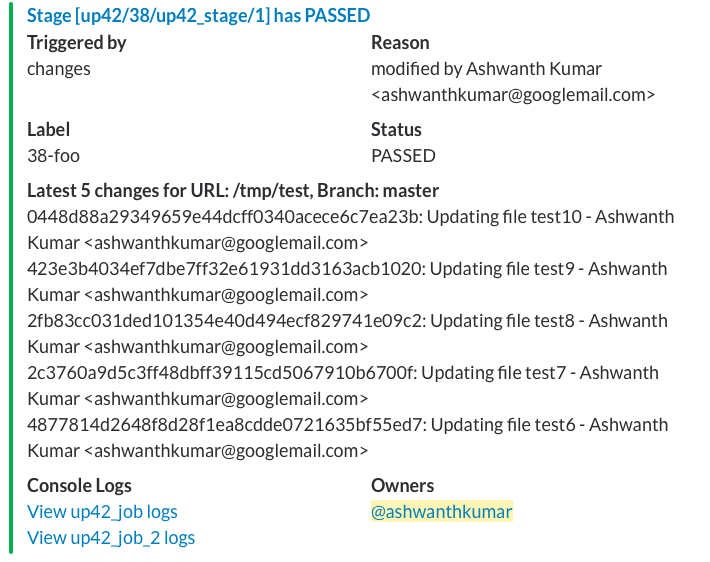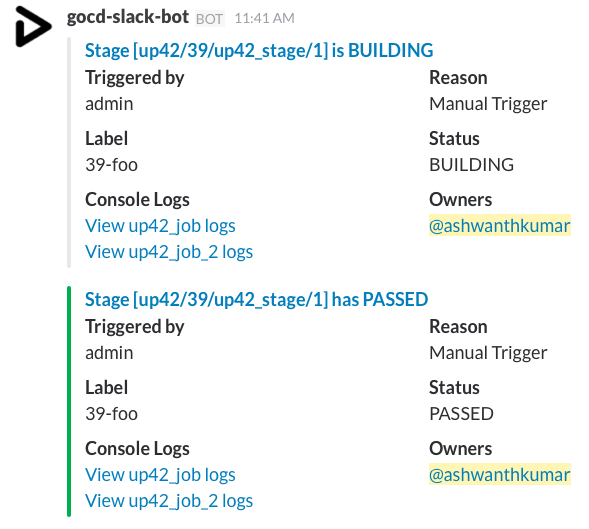Slack based GoCD build notifier
Download jar from releases & place it in /plugins/external & restart Go Server.
All configurations are in HOCON format. Plugin searches for the configuration file in the following order
- File defined by the environment variable
GO_NOTIFY_CONF. go_notify.confat the user's home directory. Typically it's thegouser's home directory (/var/go).go_notify.confpresent at theCRUISE_SERVER_DIRenvironment variable location.
You can find the details on where / how to setup environment variables for GoCD at the documentation.
Minimalistic configuration would be something like
gocd.slack {
login = "someuser"
password = "somepassword"
server-host = "http://localhost:8153/"
api-server-host = "http://localhost:8153/"
webhookUrl = "https://hooks.slack.com/services/...."
# optional fields
channel = "#build"
slackDisplayName = "gocd-slack-bot"
slackUserIconURL = "http://example.com/slack-bot.png"
display-console-log-links = true
displayMaterialChanges = true
process-all-rules = true
proxy {
hostname = "localhost"
port = "5555"
type = "socks" # acceptable values are http / socks
}
}login- Login for a Go user who is authorized to access the REST API.password- Password for the user specified above. You might want to create a less privileged user for this plugin.server-host- FQDN of the Go Server. All links on the slack channel will be relative to this host.api-server-host- This is an optional attribute. Set this field to localhost so server will use this endpoint to getPipelineHistoryandPipelineInstancewebhookUrl- Slack Webhook URLchannel- Override the default channel where we should send the notifications in slack. You can also give a value starting with@to send it to any specific user.display-console-log-links- Display console log links in the notification. Defaults to true, set to false if you want to hide.displayMaterialChanges- Display material changes in the notification (git revisions for example). Defaults to true, set to false if you want to hide.process-all-rules- If true, all matching rules are applied instead of just the first.truncate-changes- If true, displays only the latest 5 changes for all the materials. (Default: true)proxy- Specify proxy related settings for the plugin.proxy.hostname- Proxy Hostproxy.port- Proxy Portproxy.type-socksorhttpare the only accepted values.
By default the plugin pushes a note about all failed stages across all pipelines to Slack. You have fine grain control over this operation.
gocd.slack {
server-host = "http://localhost:8153/"
webhookUrl = "https://hooks.slack.com/services/...."
pipelines = [{
name = "gocd-slack-build"
stage = "build"
group = ".*"
state = "failed|passed"
channel = "#oss-build-group"
owners = ["ashwanthkumar"]
webhookUrl = "https://hooks.slack.com/services/another-team-hook-id..."
},
{
name = ".*"
stage = ".*"
state = "failed"
}]
}gocd.slack.pipelines contains all the rules for the go-server. It is a list of rules (see below for what the parameters mean) for various pipelines. The plugin will pick the first matching pipeline rule from the pipelines collection above, so your most specific rule should be first, with the most generic rule at the bottom. Alternatively, set the process-all-rules option to true and all matching rules will be applied.
name- Regex to match the pipeline namestage- Regex to match the stage namegroup- Regex to match the pipeline group namestate- State of the pipeline at which we should send a notification. You can provide multiple values separated by pipe (|) symbol. Valid values are passed, failed, cancelled, building, fixed, broken or all.channel- (Optional) channel where we should send the slack notification. This setting for a rule overrides the global settingowners- (Optional) list of slack user handles who must be tagged in the message upon notificationswebhookUrl- (Optional) Use this webhook url instead of the global one. Useful if you're using multiple slack teams.

